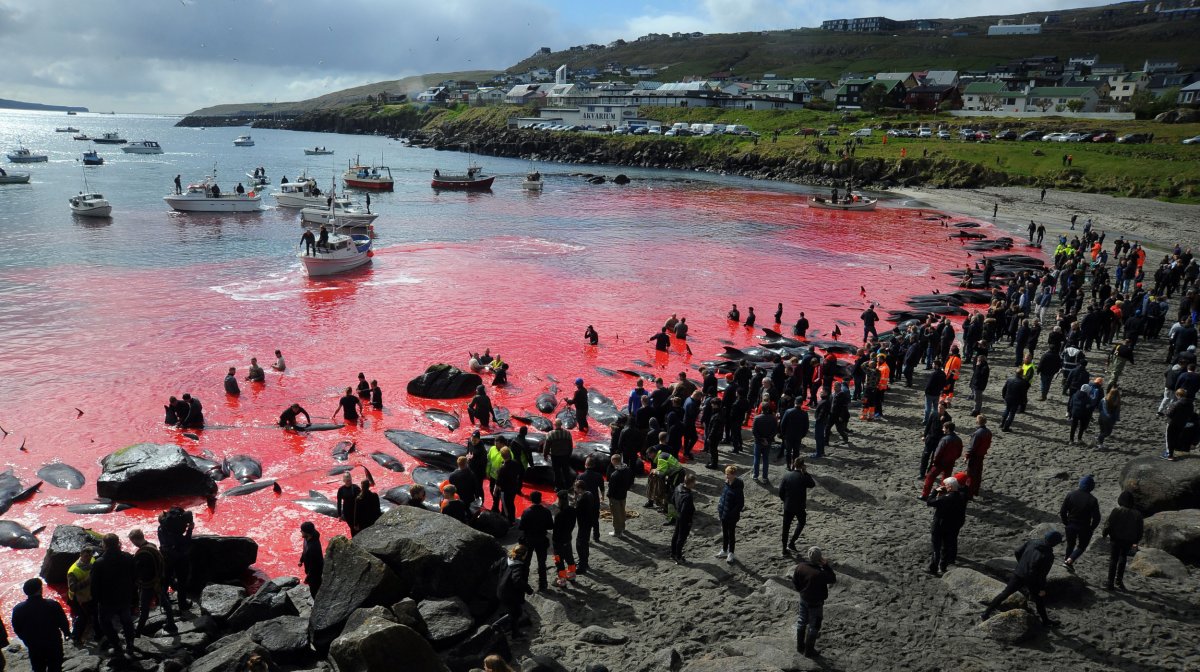Sea Shepherd, an international animal rights group, stressed Wednesday that it hopes the Faroe Islands will end its drive of sea mammals into shallow waters, where they are then slaughtered for their meat and blubber.
Video footage of the slaughter showed 1,428 white-sided dolphins being gruesomely killed on the central Faroe island of Eysturoy in the North Atlantic archipelago. The count was much higher than in recent years and the footage suggested that the hunters may not have adhered to guidelines meant to ease the suffering of the animals.
"It was a complete disaster, completely unprecedented in fact, it could even be the largest single hunt of cetaceans in documented history anywhere in the world," said Robert Read, campaign director for the Sea Shepherd Conservation Society.
For more reporting from the Associated Press, see below:

Environmental activists have long claimed the practice is cruel. But this year even people on the Faroes who defend the four-century-old practice have spoken out amid fears that this year's slaughter will draw unwanted attention.
"We must admit that things did not go as we would like to," said Hans Jacob Hermansen, the former chairman of the Faroese association behind the drives. "We are going to evaluate if anything went wrong, what went wrong and why, and what can we do to avoid that in the future."
Sea Shepherd said it is hoping for "much tighter restrictions" around such hunts and, if not, "at least a ban on the killing of the Atlantic white-sided dolphins."
Faroese hunters are used to criticism from animal rights groups and push back at what they see as an interference in a cultural practice.
Each year, islanders drive herds of the mammals—chiefly pilot whales—into shallow waters, where they are stabbed to death. A blow-hole hook is used to secure the beached whales and their spine and main artery leading to the brain are severed with knives, turning water in the bay red with blood. The drives are regulated by law and the meat and blubber are shared on a community basis.
"The killing of pilot whales is not very much different from killing cattle or anything else. It's just that we have an open abattoir," Hermansen told the Associated Press. "Everyone can see it...but if a cow also doesn't die immediately, you don't stop killing cattle."
The white-side dolphins and pilot whales are not endangered species.
But Read said Sunday's slaughter was "completely indiscriminate. The entire pod is killed and pregnant mothers, calves, everything." He added that residents used "powerboats and jet skis to chase dolphins and pilot whales for hours on end, they really have no chance of escape."
Fisheries Minister Jacob Vestergaard said everything this year was done by the book in the dolphin hunt. The Faroes—18 rocky islands located halfway between Scotland and Iceland—are semi-independent and part of the Danish realm.
Uncommon Knowledge
Newsweek is committed to challenging conventional wisdom and finding connections in the search for common ground.
Newsweek is committed to challenging conventional wisdom and finding connections in the search for common ground.
About the writer
To read how Newsweek uses AI as a newsroom tool, Click here.








